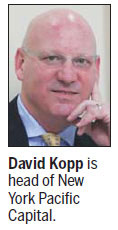VC investor targets budding smaller cities
Updated: 2011-03-04 10:47
By Wang Chao (China Daily European Weekly)
|
|
Company wants to provide lending to SMEs in less-developed areas
David Kopp learned at least one major difference after he moved his private equity (PE) business to China: Back in the United States he would sign contracts with his partners, then drink to celebrate; here he drinks with them before he gets a contract.
"It is part of the culture," he shrugged.
Coming to China in 2002, right after the Internet bubble, Kopp now has a team of 15 people in his company, New York Pacific Capital Ltd (NYPC), among whom 13 are Chinese. Although it still maintains a presence in the US, the company's headquarters are in Beijing and it recently set up an office in Suzhou, in East China's Jiangsu province. Kopp said all of his business is now China-focused.
"We are highly localized now," Kopp said. "Even my partner, one of the two foreigners in my company, has been in China for 16 years."
As a banker from Wall Street with 20 years financial experience, Kopp thought he would be smart enough to adapt to the Chinese market immediately, until he actually arrived here.
"The situation in China is like the US after the World War II with rapid industrialization. But the difference is that changes are happening much faster here. It has taken China only 20 years to go through what happened in the US in 100 years. Everything is similar, but it is very compressed here," he said.
Although Kopp's business card shows his office is in Beijing, he spends half the year on business trips. Since November, he has spent three months in Suzhou to build relationships with the local government officials, raise capital, find good investments and talk with business partners.
"We want to build a strong bond with the local government, that's why we hire local people in the surrounding area," he said.
"To medium-sized private equity companies like us, the cake lies in second- and third-tier cities."
"There are many small and medium-sized enterprises (SMEs) in this area which don't really have access to bank lending, or if they do, the funds are usually short term. The government realized that PE companies like us can bridge the capital gap and help them grow."
In December, NYPC partnered with Suzhou municipal guidance fund, its cornerstone investor, as well as the Agricultural Bank of China, to set up a fund, which aims to raise 300 million yuan (33 million euros) before the end of this year.
The fund's first closing was held before the Spring Festival, which fell on Feb 3.
"In the US, the PE market is pretty stagnant, but here it began to boom three to four years ago," Kopp said.
PE companies qualified to operate on the Chinese mainland markets raised $27.6 billion (20 billion euros) in China in 2010, double the scale of 2009.
A report from Lunar Capital shows that 80 percent of PE funds went to eastern China, the most prosperous area in the country; while 60 percent went into new energy industries.
Derek Sulger is another investor who quickly realized the great potential of second- and third-tier Chinese cities. Sulger came to China in 1999 and started Lunar Capital in Shanghai the same year, after working with Goldman Sachs for eight years in London.
"Although we have offices in Shanghai and Hong Kong, business in the Chengdu office developed much faster," Sulger said. "Given their smaller size and earlier stage of development, SMEs in second- and third-tier cities can have much steeper growth curves."
Sulger said the less-developed cities in the western regions of China remind him of Shanghai in 1999, when he first came to China.
"There are many more opportunities than expected, it is cheaper than the eastern coast, and the talent doesn't need to travel too much to work," he said.
"While everybody is talking about new energy, I'm focusing on traditional industries with less attention."
In 2007, he invested in a juice company in South China's Guangxi Zhuang autonomous region. After two years, it is providing pineapple juice and mango juice for major soft drink companies, including Coca-Cola, in China; in 2008 he invested $20 million in a meat processing company, which is expected to list in two years.
E-paper

Pearl paradise
Dreams of a 'crazy' man turned out to be a real pearler for city
Literary beacon
Venice of china
Up to the mark
Specials

Power of profit
Western companies can learn from management practices of firms in emerging economies

Foreign-friendly skies
About a year ago, 48-year-old Roy Weinberg gave up his job with US Airways, moved to Shanghai and became a captain for China's Spring Airlines.

Plows, tough guys and real men
在这个时代,怎样才"够男人"? On the character "Man"

